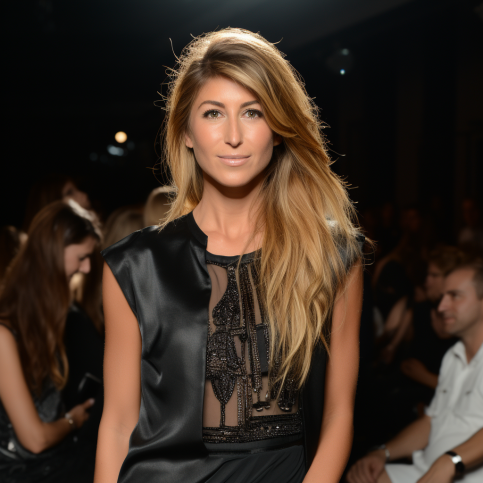Top Elle editor and ‘Project Runway’ star Nina Garcia killed a report about celebrity dietician Tanya Zuckerbrot that was later published by the Daily Beast

- Elle magazine killed an article about online bullies who were defending F-Factor’s Tanya Zuckerbrot.
- Elle editor-in-chief Nina Garcia, who sources say is friendly with Zuckerbrot, made the decision to kill the story.
- A version of the article was later published in the Daily Beast.
Hannah Seligson, a writer, knew she had a great story on her hands, one that provided a fresh perspective on Tanya Zuckerbrot, the founder of the F-Factor diet. In February, she pitched it to Elle magazine as a look at a new breed of online predators, a story that touched on wealth, celebrity, and cancel culture.
According to an email obtained by Business Insider, Elle appeared to be equally enthusiastic. Seligson, the author of “Mission: Adulthood: How Today’s 20-Somethings Are Transforming Work, Love, and Life,” writes frequently about Generation Z, culture, and social-media trends. Her work has appeared in publications such as The New York Times and Rolling Stone, among others.
Seligson submitted a draft of her report in April. It was 5,000 words long and described a three-year-long vicious revenge campaign by an anonymous online army defending Zuckerbrot from critics of her diet and lifestyle, using leaked screenshots of group chats and interviews with former participants in them.
The campaign arose from a feud between Zuckerbrot and fashion influencer Emily Gellis Lande, who accused the F-Factor diet plan of making people sick and promoting unhealthy diet culture. Zuckerbrot has sued Lande twice for defamation, both of which are still pending.
The draft was edited and legal reviewed by Hearst counsel Andrea Butler, and a publication date on Elle’s website was being discussed, according to Seligson.
However, in June, Elle abruptly dropped the story, according to Seligson. The decision was cited in an email from the article’s editor to Seligson as “editorial judgment.”
“I was irritated that they didn’t give me more of a reason,” Seligson said to BI. “It’s not a case of sour grapes. Things are slain. It is about the reasons why it was killed.”
A few weeks later, the editor of the article informed Seligson that the decision was made by Elle’s editor-in-chief, Nina Garcia. According to a reliable source, Garcia had attended meetings where the story was discussed. But, at the last minute, Garcia expressed concern that the story would be a “takedown,” according to Seligson’s editor. The editor described the decision as “immensely disappointing.” (BI examined screenshots of Seligson’s text exchange with her editor.)
Seligson was paid a standard kill fee and took her reporting elsewhere, with the Daily Beast running a version of her article in early November. The article, titled “Inside the Mean-Girl Army Going to War for a Celebrity Dietician,” is 4,500 words long and was published one day after a larger Daily Beast investigation into Zuckerbrot’s complicated feuds with Gellis Lande and another frenemy influencer. The draft Seligson submitted to Elle, which Business Insider reviewed, was similar to the Daily Beast story.
Tracy Connor, editor-in-chief of The Daily Beast, declined to comment.
Sources said Garcia and Zuckerbrot were friendly
Seligson stated that she emailed Garcia in June, requesting an explanation for why the story was killed. “It’s troubling if wealthy and powerful people are seeking to suppress legitimate reporting on an important topic, especially one which you have not let me — the reporter — plead my case on,” she said in a statement. Seligson stated that she had not received a response.
Two other sources with direct knowledge told BI that Garcia was a celebrity follower of the F-Factor diet and friendly with its founder. According to one of the sources, Zuckerbrot pleaded her case to Garcia before it was murdered, claiming that the story would cause her mental distress and citing “everything that was going on.”
At the time, F-Factor was winding down sales of its associated products and had closed its New York City private practice, which Zuckerbrot blamed on negative online campaigning against her, according to the Daily Beast in a story published the day before Seligson’s. A lawsuit has also been filed against Zuckerbrot by a group of women who claim her products harmed them; Zuckerbrot has denied the allegations in court filings, and the suit is still pending.
Garcia and her representatives have yet to respond to multiple requests for comment. “Tanya Zuckerbrot does not control the media; if she did, F-Factor, which received unjustified negative treatment by the media, would still be in business,” said Zuckerbrot’s lawyer.
It is unusual for an editor to kill a story after it has been edited and legally vetted. Elle is best known for its fashion and beauty coverage, but it has a history of supplementing that with coverage of politics and other serious topics; Garcia has cited Elle’s coverage of reproductive rights and women’s sports under her leadership as examples.
The episode also highlights the difficult terrain that top editors can find themselves in when it comes to personal ties to story subjects and the impact those relationships can have on coverage decisions.
Garcia took over as editor-in-chief of Elle in 2017, succeeding longtime editor-in-chief Robbie Myers. Garcia has worked in fashion magazines her entire career and has helped redefine the role of fashion editors as a longtime judge on the reality TV show “Project Runway.” Garcia stated that she wanted to “amplify the DNA of the brand” when she took over at Elle. It’s daring, provocative, inclusive, democratic, and forward-thinking.”
Elle was at the center of a controversy two years into Garcia’s tenure when it fired 26-year columnist E. Jean Carroll, who had published a book that year accusing Donald Trump of raping her. Carroll blamed her firing on his damage to her reputation; Elle said the decision was business-related, not political, according to The New York Times.
Hearst-owned Esquire made headlines in 2019 when top Hearst executives killed an exposé on Hollywood bigwig director Bryan Singer; The Atlantic later published the story.
Zuckerbrot has denied directing online supporters
Zuckerbrot, for her part, is known for going after her critics with zeal. According to Seligson’s Daily Beast article, she has promoted messages on social media that question the integrity of journalists covering F-Factor, and she has broadcast where Seligson’s children go to school on Instagram Live.
Zuckerbrot has insisted that she did not direct her online supporters to defend her and that she has no control over what they post, but she has publicly praised and thanked them online, according to Seligson. Since the Israel-Hamas war began on October 7, Zuckerbrot has largely avoided discussing F-Factor on social media in favor of focusing on the conflict.
The fervor of Zuckerbrot’s fan base is on full display in an Instagram Live broadcast by Zuckerbrot after Seligson approached her for comment on the Daily Beast article. While the broadcast is no longer available, screenshots obtained by BI demonstrate how zealously Zuckerbrot’s fans can behave in the face of threats of negative press coverage of the F-Factor founder.
“Let’s go to the editors — between us, we all know so many people,” one commenter suggested. Another person wrote, “You are vile Hannah Seligson.”
When Seligson reached out to egtruthfully, an Instagram account that has been a staunch supporter of Zuckerbrot and whom she has praised and thanked on Instagram Live, for comment on the Daily Beast article, the account responded with a lengthy tirade, which was also viewed by Business Insider, in which she was referred to as a “bottom feeding sad, pathetic woman who is desperate for relevancy at any cost.”





